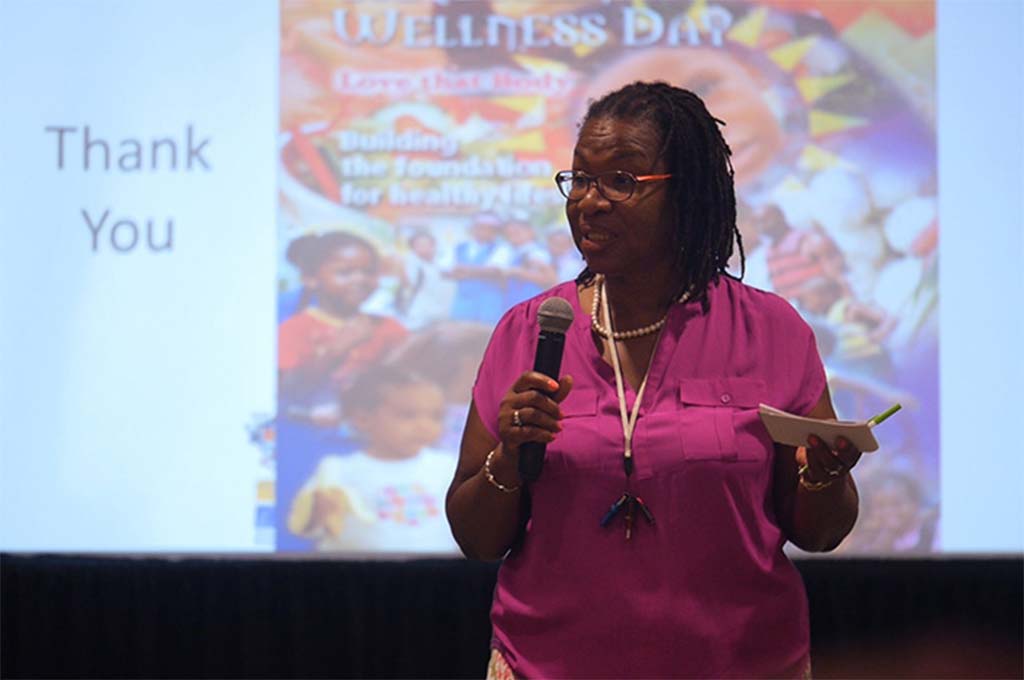- July 04th, 2016
- /
- NCD Stories
- /
- 0 Comments
- /
- Jamaica has a ‘man problem’

Dr Alafia Samuels, Director, Chronic Disease Research Centre and meeting host
Jamaica has a ‘man problem’
Kingston, Jamaica, 28 June, 2016: Sudden, unexpected deaths, especially among middle-aged Jamaican and Caribbean men is often due to undiagnosed and untreated high blood pressure: the number one risk factor for heart attack and stroke in the region and globally. This was one of the stark messages emerging from a key meeting held in Kingston on June 28.
The meeting, ‘Engaging all-of-society in accelerating the chronic disease response’, brought together a wide range of organisations and individuals to examine the gaps in prevention, diagnosis and control of these chronic diseases which need to be tackled through a fully multisectoral response, bringing all-of-society to the table. So journalists, the business community, consumer action groups, policemen, fishermen’s groups, dieticians, faith-based organisations, civil society groups and academics joined with the health sector and others to share information and ideas. The gathering was chaired by Deborah Chen, Executive Director of the Heart Foundation of Jamaica.
Kingston, Jamaica, 28 June, 2016: Sudden, unexpected deaths, especially among middle-aged Jamaican and Caribbean men is often due to undiagnosed and untreated high blood pressure: the number one risk factor for heart attack and stroke in the region and globally. This was one of the stark messages emerging from a key meeting held in Kingston on June 28.
When you hear of a man in his 40s or 50s suddenly dropping dead, this is most likely due to undiagnosed hypertension. It is killing them. Jamaica has a definite ‘man problem’ and we need to do something about it. Dr Alafia Samuels
The meeting, ‘Engaging all-of-society in accelerating the chronic disease response’, brought together a wide range of organisations and individuals to examine the gaps in prevention, diagnosis and control of these chronic diseases which need to be tackled through a fully multisectoral response, bringing all-of-society to the table. So journalists, the business community, consumer action groups, policemen, fishermen’s groups, dieticians, faith-based organisations, civil society groups and academics joined with the health sector and others to share information and ideas. The gathering was chaired by Deborah Chen, Executive Director of the Heart Foundation of Jamaica.
According to Dr Alafia Samuels, Director of the Chronic Disease Research Centre and head of a wide-ranging evaluation of the 2007 CARICOM Heads of Government Port of Spain Declaration on chronic diseases1, this situation is unacceptable.
“When you hear of a man in his 40s or 50s suddenly dropping dead, this is most likely due to undiagnosed hypertension. It is killing them. Jamaica has a definite ‘man problem’ and we need to do something about it.” Dr Samuels added that men have worse control of chronic conditions than women, higher death rates, visit health services less (“Men have to be dropping down before they go to the doctor…”) and have higher rates of alcohol abuse and tobacco use.
Dr Samuels also noted the rise in childhood obesity as a serious issue for Jamaica and the Caribbean as a whole, citing fast food becoming a staple of many children’s diets. She said that 30% of children’s calories now come from sweets, drinks, salty snacks and fast food, that three quarters are drinking sugar-sweetened sodas and one in 20 is clinically obese. In addition it was argued that physical education should be compulsory in all schools, an assertion that has prompted subsequent debate in Jamaica.
- No Time For PE – Students Focused On Exams After Ninth Grade, Says Reid
- Letter Of The Day | Make PE Mandatory In High Schools
- Jennifer Ellison Brown | The Impact Of Physical Education And Sport
- Patria-Kaye Aarons | Make PE, After-School Sports Mandatory
There was a frank and lively discussion about what can be done to tackle these issues, with a range of contributors fully engaged in charting the way forward, exchanging thoughts, experiences and best practices. Participants raised the need to use a more creative approach to spreading the NCD message as traditional health-based messaging was not hitting the mark.
Widening the constituency of those talking about chronic diseases should be encouraged with ‘champions’ from the worlds of sport and entertainment encouraged to play a greater role. There were also calls to examine Jamaican food culture and promote a return to more traditionally healthy, home-grown produce, with a recognition that the pace of modern life means that people often just grab what they can and don’t have time to cook. There was a suggestion that we should plant fruit trees instead of ornamental trees to increase the availability of fresh fruits.
It was universally agreed that the response to chronic diseases could only be successful if it was truly multisectoral and an all-of-society approach employed. Participants hoped that the meeting would form the basis of a loose NCD coalition. As Chair Deborah Chen maintained, “We in the health sector can’t do it alone. The only way we’re going to have success is if we all work together.”
PowerPoint Presentations
- Accelerating action on NCDs Dr Alafia Samuels
- NCDs the Jamaican case study June 28 2016 Dr Michelle Harris
More voices from the NCD response:
- Anastasia Cunningham, News and Health Coordinator, The Gleaner
- Orlean Mears, HR Manager, Grace Kennedy Ltd.
- Rev Gary Harriott, General Secretary, Jamaica Council of Churches
- Alfred Francis, Running Events Ltd
- Michael Diamond, Vice President National Consumer League of Jamaica
See more images from the meeting below.
1 The Port of Spain evaluation is led by the University of the West Indies on behalf of CARICOM and PAHO and funded by Canada’s International Development Research Centre. It examines the success and challenges of the 2007 Port of Spain Declaration and suggests ways to accelerate action.



